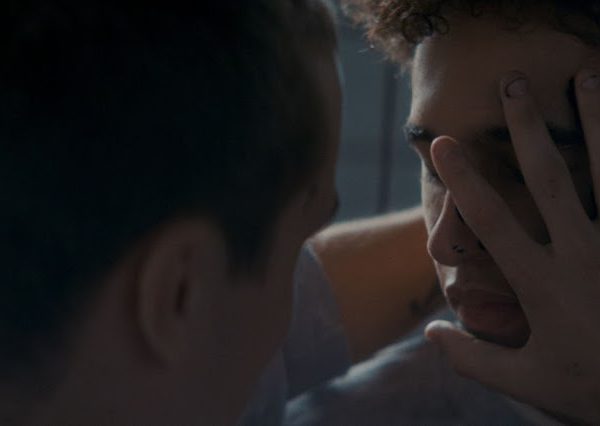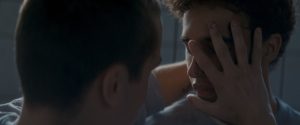„My ne zgasnemo (We Will Not Fade Away)“ is the new documentary of award-winning Ukrainian
director Alisa Kovalenko and premiered at the Berlinale 2023 in the
Generation 14+ section. Her film closely follows the lives of five teenagers in the
embattled Donbass region just before the Russian invasion in February 2022.
Freie Generationen Reporter:innen: Alisa, after the Russian invasion,
you decided to join the armed forces of Ukraine and fight at the frontline.
When and why did you decide to go back to working on your documentary?
Alisa Kovalenko (Director): After the Russian invasion, I stopped
believing in the power of cinema. I felt useless as a documentary directory.
My entire system collapsed, and I felt like I needed to do everything in my
power, to prevent the Russians from destroying our country.
But after four months in the volunteer unit our base was destroyed, a friend
of mine died – we had a funeral ceremony in his village. Afterward, I had a
short period of time when I had to decide whether I wanted to sign a contract
with the regular army or finish my documentary.
It was a hard choice to make, because signing a contract with the army means
that you will have to stay at the frontline until the end of the war. So, one,
maybe two years. I had a long discussion with my producer, and he pointed out
to me, that we have a responsibility to all the people, who already invested
so much of their lives in this film. I felt like he was right, so yeah, I went
back to editing.
FGR: You say you stopped believing in the power of cinema. What do
you think about the role of cinema in conflict today?
Kovalenko: I started believing again. I think there are
different ways movies can have an impact on conflict. Some document crimes, I
don’t know if you have seen the “Visual Investigation” series of the NY Times.
But with “We will not fade away” I tried to create more of an existential,
emotional experience. We can hear the most horrible things in the news, but
forget them a few days later. Emotion stays on your mind, and I think this is
the strength of film.
FGR: Did you create the movie with a specific audience in mind?
Kovalenko: No, I didn’t really think about the audience while
filming. But I am super curious how it is perceived by teenagers.
FGR: Well, your movie itself follows five Ukrainian teenagers
through their lives. How did you find your protagonists?
Kovalenko: The whole process started in 2018 with an idea
of the famous Ukrainian explorer Valentine. He had the dream to create a kind
of adventure-therapy-trip to the Himalayas for kids from the war zone, who
dreamed about traveling, but never traveled before. We asked teenagers to
apply for the project and selected the five, who we felt had the strongest
motivation.
FGR: Your movie takes a very intimate and eye-leveled look at their
lives. How were you able to build such a trustful relationship, not only with
them, but also their families?
Kovalenko: Actually, the teenagers had great
families. Like the kind of family where you arrive and feel at home. Of
course, there are also uncomfortable moments, but this is really about
spending time together. I spent so much time with them, talked to them, some
people around us started to think I am a teenager as well.
FGR: Really? How did that look like?
Kovalenko: One time I went to party with
Liza, and in the beginning I wanted to bring my camera, but since I didn’t
know any of the other teenagers I decided not to. So, I just joined the group,
drank with them and then this one boy came up to me and started to flirt. We
had an age gap of like 20 years! I was like oh my God, but it was a good sign,
because it meant I was inside. I wasn’t an alien anymore, but part of this
reality.
FGR: Haha, so you didn’t have a camera crew?
Kovalenko: No, in the beginning I had a
camera man, but we were short on money and a crew is obviously very expensive.
So, sometimes I went without crew. I would say about 60% of the footage that
ended up in the movie was shot by myself.
The full-scale war helped us somehow to crystallize what’s important.
FGR: How did your documentary change during post-production? You
must have had a lot of raw footage after spending so much time with the
teenagers.
Kovalenko: We entered the postproduction process after I
returned from fighting. Watching the footage was very emotional, because we
saw some places which were now destroyed or people now under Russian
occupation. It was terrible.
But we restructured the whole project completely during this process. The
full-scale war helped us somehow to crystallize what’s important. It was hard
to build an organic dramaturgical line from all those mosaic pieces.
FGR: I really liked the way you used music in your movie. Before
the first notes played, I was a bit afraid you might create an artificial
overly emotional atmosphere, by just dumping music on everything, but I felt
like you just hit the sweet spot.
Kovalenko: Oh yeah, I really hate those American documentaries, because
there is music everywhere. I tried to use the music to give another voice to
the teenagers. In their lives, music is everywhere, they listen to it all the
time.
But of course, all of them listen to very different types of music. So, my
challenge was to find a kind of universal music to be their voice. Our budget
was capped, so Billie Eilish or something like that was not an option. At that point, we decided to work with a composer. He came from Poland and was very
young. That was important to me as well, because he was able to capture the
spirit of the teenagers.



